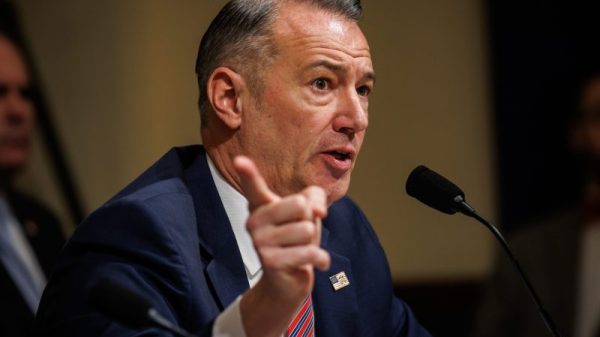Almost a year ago, eight House Republicans teamed up with Democrats to oust Speaker Kevin McCarthy (R-Calif.) in an unprecedented vote.
Since then, a political network linked to McCarthy has sought to exact revenge against some of those Republicans in their primaries for reelection to the House. Two chose not to seek reelection, two did not draw any challengers, three beat back challengers and just one — Rep. Bob Good (Va.) — lost his primary.
Taken together, the results mean that five of the anti-McCarthy Republicans are likely to return to Congress, given that they all represent GOP-friendly districts where the general election is not expected to be competitive.
The leader of the anti-McCarthy faction, Rep. Matt Gaetz (Fla.), was the last of the rebels to face a primary opponent — and won by a wide margin on Tuesday. Gaetz defeated Aaron Dimmock, a retired Naval officer whom McCarthy publicly backed, with 73 percent of the vote.
A super PAC linked to McCarthy had spent more than $3 million targeting Gaetz, airing attack ads focused on allegations that he had sex with a minor. Gaetz has denied any wrongdoing, and the Justice Department declined to bring charges last year, but the House Ethics Committee is still investigating.
At his election night event, Gaetz taunted McCarthy, noting that he was winning with a larger vote share than in his last primary.
“Kevin, if you’re watching, spend a little more next time and we’ll get to 80,” Gaetz said.
A spokesperson for McCarthy did not respond to a request for comment.
Here is what happened to the seven other House Republicans who voted to remove McCarthy:
Rep. Andy Biggs (Ariz.)
Biggs went uncontested in his July 30 primary.
Rep. Ken Buck (Colo.)
Buck resigned from the House in March. He had announced in November that he would not seek reelection.
Buck criticized his party in his retirement announcement, saying that “too many Republican leaders are lying to America” and spreading election denialism after Donald Trump’s 2020 defeat.
A June special election to fill Buck’s seat was won by Republican Greg Lopez, a former mayor of Parker, Colo. Lopez promised to be a placeholder, clearing the way for Rep. Lauren Boebert (R) — a staunch Trump ally — to be Buck’s likely successor next year after switching districts for her reelection bid.
Rep. Tim Burchett (Tenn.)
Burchett faced no opposition in Tennessee’s Aug. 1 primary.
Jimmy Matlock, a former state representative who ran against Burchett in 2018, considered challenging Burchett again but announced in February that he had decided against it.
Rep. Elijah Crane (Ariz.)
Crane faced one primary challenger, former Yavapai County supervisor Jack Smith, in Arizona’s July 30 primary. He won with 79 percent of the vote.
The McCarthy-linked nonprofit American Prosperity Alliance spent a modest sum — a little over $250,000 — advertising in the primary. One TV spot criticized Crane as weak on border security.
Smith criticized Crane for voting to oust McCarthy but denied being recruited by the former speaker.
Rep. Bob Good (Va.)
Good, head of the conservative House Freedom Caucus, lost his reelection bid in a hard-fought June 16 primary against Virginia state Sen. John McGuire III. The race was so close that it went to a recount, which affirmed McGuire’s victory.
The biggest difference compared with the other primaries was that Trump sided against the incumbent, endorsing McGuire and bashing Good as disloyal for backing Florida Gov. Ron DeSantis in the 2024 presidential primary. Good endorsed Trump after DeSantis dropped out.
McCarthy made no secret of his involvement in the primary, saying he had been “really engaged.” The primary drew more than $10 million in outside spending, according to Federal Election Commission records, including over $4 million from an anti-Good super PAC, American Patriots PAC.
Trump, who otherwise did not target many House incumbents this primary season, starred in a TV ad for McGuire and headlined a tele-rally the night before the primary.
Rep. Matt Rosendale (Mont.)
Rosendale did not seek reelection after a whirlwind series of events this year.
He first launched a campaign for Senate but dropped out less than a week later after Trump endorsed his opponent — and the eventual GOP nominee — former Navy SEAL Tim Sheehy. Less than a month later, Rosendale abandoned his House reelection bid and said he would not seek any office this year.
Montana State Auditor Troy Downing won a crowded June 4 primary to succeed Rosendale in his eastern Montana district. Trump endorsed Downing a day before the contest.
Rep. Nancy Mace (S.C.)
Mace defeated two primary challengers with 57 percent of the vote.
Her most serious opponent was Catherine Templeton, the former director of South Carolina’s labor agency. Templeton had McCarthy’s support, and a McCarthy-allied super PAC, South Carolina Patriots PAC, spent nearly $4 million trying to defeat Mace, according to FEC records.
Templeton and her allies portrayed Mace as an inconsistent conservative too focused on the media spotlight. Mace, who faced a Trump-backed challenger in her last primary, leaned into her newfound status as a Trump ally.
McCarthy shrugged off Templeton’s loss, saying in a radio interview that Trump’s endorsement is “very strong” and that the “real race” would be Good’s, which was upcoming at the time.



























